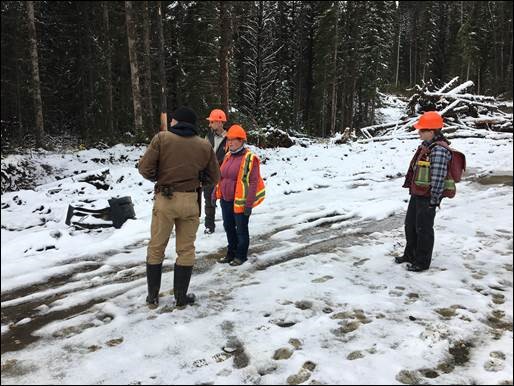
Investigation finds BCTS managing fisher habitat
VICTORIA – An investigation of a complaint by a trapper has found that BC Timber Sales (BCTS) is meeting government’s expectations to manage habitat for fishers (a type of weasel) and has accommodated the trapper’s interests in its forestry plans and practices.
“Our investigation found that government has provided forest licensees in the Cariboo Natural Resource Region with clear expectations for managing fisher habitat, and district managers used their powers under the Forest and Range Practices Act to ensure those expectations are being met,” said Kevin Kriese, chair, Forest Practices Board. “The district managers placed conditions on the approval of forest stewardship plans to ensure they would address fisher habitat needs. This is a constructive approach to ensure wildlife values are addressed in forestry operations.”
The trapper was concerned that timber harvesting is removing habitat for furbearers and is affecting his ability to make a living. While the trapper does not believe there should be any more harvesting permitted in his trapline, he consulted with BC Timber Sales and provided input to the planning process, which was accepted. BCTS’s current forest stewardship plan includes measure to address the district manager’s expectations.
In the Cariboo Region, government has done more to ensure fisher habitat conservation than the board has seen in other areas where it investigated similar complaints. However, the report notes that it remains to be seen how effective these actions will be.
“It is important for government to ensure a comprehensive monitoring system is in place, along with a process to revise practices as necessary,” Kriese said.
Specific measures taken include using the provincial fisher tool to assess habitat, using a qualified biologist to field verify habitat, establishing a wildlife corridor through the area, leaving wider reserves beside streams and wetlands and protecting active fisher dens and rest trees that are identified during road building or timber harvesting.
The complainant’s trapline is a 13,500-hectare area located on the north side of Highway 24, between Clearwater and 100 Mile House. The trapline is within the traditional territories of the Canim Lake Band, Neskonlith Indian Band, Northern Secwepemc Nation, Secwepemc Nation and Simpcw First Nation.
Fisher habitat includes old forest stands with large trees, snags and coarse woody debris. Fishers prefer landscapes with large areas of connected forest and avoid non-forested openings.
The Forest Practices Board is B.C.’s independent watchdog for sound forest and range practices, reporting its findings and recommendations directly to the public and government. The board investigates public complaints about forest and range practices on public lands and appropriateness of government enforcement. It can also make recommendations for Forest Practices Board improvement to practices and legislation.
Contact:
Darlene Oman
Communications
Forest Practices Board
250 213-4705 / 1 800 994-5899
